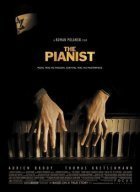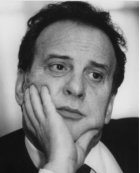
The Pianist Page #15
SZPILMAN:
Very appropriate.
HENRYK:
(taking the book
back and resuming
his reading)
Yes, that's why I brought it.
Later:
The Szpilmans seated on the kerb. Their attention is caught
by a BOY who has a box of sweets on a string round his
neck. And he's setting the sweets, pocketing money.
HENRYK:
Idiot. What's he think he's going
to do with the money?
Father calls to the Sweet Boy and beckons him over.
FATHER:
How much for a caramel?
THE SWEET BOY:
Twenty zlotys.
FATHER:
What? For one caramel? What d'you
think you're going to do with the
money?
THE SWEET BOY:
Twenty zlotys.
FATHER:
(turning to the
family)
Have we got twenty between us?
They search their pockets and handbags, hand over to Father
what change they can find. He, in turn, hands the money to
the Sweet Boy, who hands over one caramel and goes on his
way.
Father holds the caramel between thumb and forefinger and
examines it carefully. Then, carefully takes out his
penknife and with great care divides the caramel into six
pans. He hands a part to each of the family.
They all exchange a look, an acknowledgement of each other,
almost like a toast, and then they chew, slowly,
deliberately.
The whistle of a locomotive. Sound of trucks rattling over
the rails.
At once, a sound of great agitation from the Jews in the
compound.
EXT. RAILWAY SIDING - DAY
The locomotive pulling cattle and goods trucks comes into
sight, rolling slowly towards the boundary of the
Umschlagplatz and coming to a halt.
EXT. RAILWAY SIDING - DAY
A cordon of Jewish policeman and SS guards. Among the great
throng of people, the Szpilmans trudge towards the train.
Szpilman and Halina walking.
SZPILMAN:
Halina?
HALINA:
What?
SZPILMAN:
Funny time to say this.
HALINA:
What?
SZPILMAN:
wish I knew you better.
HALINA:
(a smile)
Thanks.
THE TRAIN:
The Szpilmans near the train. The first trucks are already
full, the people inside pressed close together, SS men
pushing them with their rifle butts.
People in the trucks cry out in desperation.
The Szpilmans are pushed along by SS men along the cordon
of Jewish policemen, past loaded trucks.
Then, suddenly:
A VOICE:
Szpilman! Szpilman!
A Jewish policeman grabs Szpilman by his collar and pulls
him back out of the police cordon. It's Heller. The rest
of the family have reached the next truck to be filled.
A scuffle as Szpilman tries to resist. Another Jewish
policeman shoves him.
Szpilman stumbles, falls to the ground, in front of him
the closed ranks of the Jewish policemen's backs.
He stands, runs at the cordon, seeing between their heads,
shoulders, Mother, Regina, Henryk and Halina clambering
into the trucks. Father is looking around, bewildered.
SZPILMAN:
(yelling)
Papa!
Father sees him, takes a step towards him, but stops,
smiling helplessly. He raises his hand and waves, then
turns and goes towards the trucks.
Again, Szpilman flings himself at the policemen's shoulders.
SZPILMAN:
(desperate)
Papa! Mama! Halina!
Heller turns on him.
HELLER:
What do you think you're doing,
Szpilman? I've saved your life!
Now, go on, save yourself!
Szpilman stands for a moment, confused, terrified. Then he
turns and starts to run.
HELLER:
Don't run!
Szpilman drops to walking pace, makes for the gates. Workers
are pushing carts piled with the bloated corpses that lay
against the wall. Szpilman falls in with them and they
pass through the gates.
EXT. TRAIN - DAY
The doors of the trucks are closed. The train begins to
move. Slow, laborious. From the trucks, the faint cries of
the occupants.
EXT. STREET BY THE SIDING - DAY
Szpilman catches his breath by a building. An SS man and
Jewish policeman emerge. The Jewish policeman is servile,
crawling to the German. He points to the train -
JEWISH POLICEMAN
Well, off they go for meltdown!
They laugh as they walk away. Szpilman turns and stumbles
down the empty street. The cries from the trucks fading.
He begins to weep, loud, agonised sobs, and staggers on.
EXT. GHETTO STREET - EVENING
Szpilman, lost, empty, aimless, tries to catch his breath
in the aftermath of his tears.
He wanders forlornly down the street, passing empty
buildings with their doors open, windows smashed. Furniture,
torn mattresses and pillows lie scattered. Feathers fly.
Desolation.
Translation
Translate and read this script in other languages:
Select another language:
- - Select -
- 简体中文 (Chinese - Simplified)
- 繁體中文 (Chinese - Traditional)
- Español (Spanish)
- Esperanto (Esperanto)
- 日本語 (Japanese)
- Português (Portuguese)
- Deutsch (German)
- العربية (Arabic)
- Français (French)
- Русский (Russian)
- ಕನ್ನಡ (Kannada)
- 한국어 (Korean)
- עברית (Hebrew)
- Gaeilge (Irish)
- Українська (Ukrainian)
- اردو (Urdu)
- Magyar (Hungarian)
- मानक हिन्दी (Hindi)
- Indonesia (Indonesian)
- Italiano (Italian)
- தமிழ் (Tamil)
- Türkçe (Turkish)
- తెలుగు (Telugu)
- ภาษาไทย (Thai)
- Tiếng Việt (Vietnamese)
- Čeština (Czech)
- Polski (Polish)
- Bahasa Indonesia (Indonesian)
- Românește (Romanian)
- Nederlands (Dutch)
- Ελληνικά (Greek)
- Latinum (Latin)
- Svenska (Swedish)
- Dansk (Danish)
- Suomi (Finnish)
- فارسی (Persian)
- ייִדיש (Yiddish)
- հայերեն (Armenian)
- Norsk (Norwegian)
- English (English)
Citation
Use the citation below to add this screenplay to your bibliography:
Style:MLAChicagoAPA
"The Pianist" Scripts.com. STANDS4 LLC, 2025. Web. 14 Jan. 2025. <https://www.scripts.com/script/the_pianist_72>.



Discuss this script with the community:
Report Comment
We're doing our best to make sure our content is useful, accurate and safe.
If by any chance you spot an inappropriate comment while navigating through our website please use this form to let us know, and we'll take care of it shortly.
Attachment
You need to be logged in to favorite.
Log In